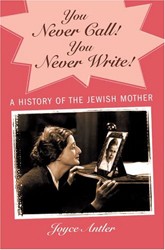Following a car accident she hardly remembers, Rebecca Rosenthal finds herself in Heaven in the company of Amalia Freud, Jeanne Proust, Pauline Einstein, Minnie Marx, Louise Cohen, Mina Kacew, and Nettie Konigsberg — the mothers of some of the greatest Jewish minds, writers, and comedians of the past two centuries. With a library fully stocked with their sons’ complete works, these women spend their eternal days boasting and bickering together, recounting their mortal lifetimes, and playing Musical Chairs and The Most Successful Son (the crowd favorite).
The newest addition to the morticious retinue holds the advantage of being a French professor (like David-Weill) at the Sorbonne. Rebecca can recognize her new companions by their portraits — even naming the artists commissioned to paint them — and written depictions in their sons’ memoirs.
She can recite verbatim the advertisement for the sale of Marcel Proust’s great-uncle’s home in Auteuil.
The distress over her death and permanent departure from her adult child, Nathan, is soon assuaged by Rebecca’s interest in the prodigal offspring of her company and the realization that her place among them must prove her chronically unambitious son destined for greatness. Thrilled to find a willing audience in the new arrival, the mothers eagerly regale Rebecca with their memories, holding her in contempt at the slightest hint of criticism or critique about their parenting. They have been sharing their small corner of Heaven long enough to sustain irrevocable disputes — mostly over their children’s genius — and resurging irritations between one another, but they remain where they are for their shared pleasure in liberty from marital responsibilities and the delicate contentment of peer female companionship, bound by their roles as Jewish mothers: “a synonym for being loving, devoted, heroic, possessive, demanding, paranoid, anxious, unbearable, nosy, and always obsessed with one’s children, from their food to their safety.”
Jewish Mothers Never Die runs a bit skimpy on plot, heavy on dialogue, and rich in discussion of classic literature and film. The novel reads like a running “so-and-so meet in Heaven” joke, reiterated on a different theme with each chapter: light, enjoyable, and cleverly staged.
Related content:
- On Writing a Fictionalized Account of Baruch Spinoza’s Family by Gabi Gleichman
- This Storm Is What We Call Progress by Michael David Lukas
- 7 Things You Probably Didn’t Know About Sigmund Freud by Mark Steiner
Nat Bernstein is the former Manager of Digital Content & Media, JBC Network Coordinator, and Contributing Editor at the Jewish Book Council and a graduate of Hampshire College.





